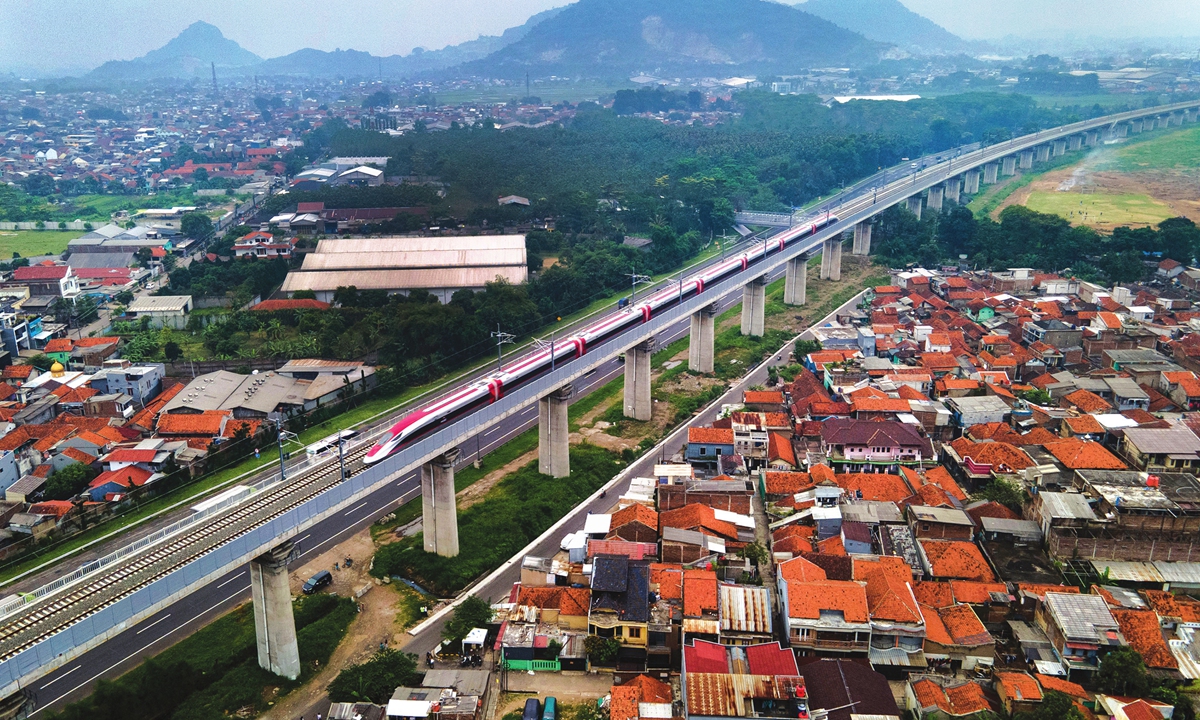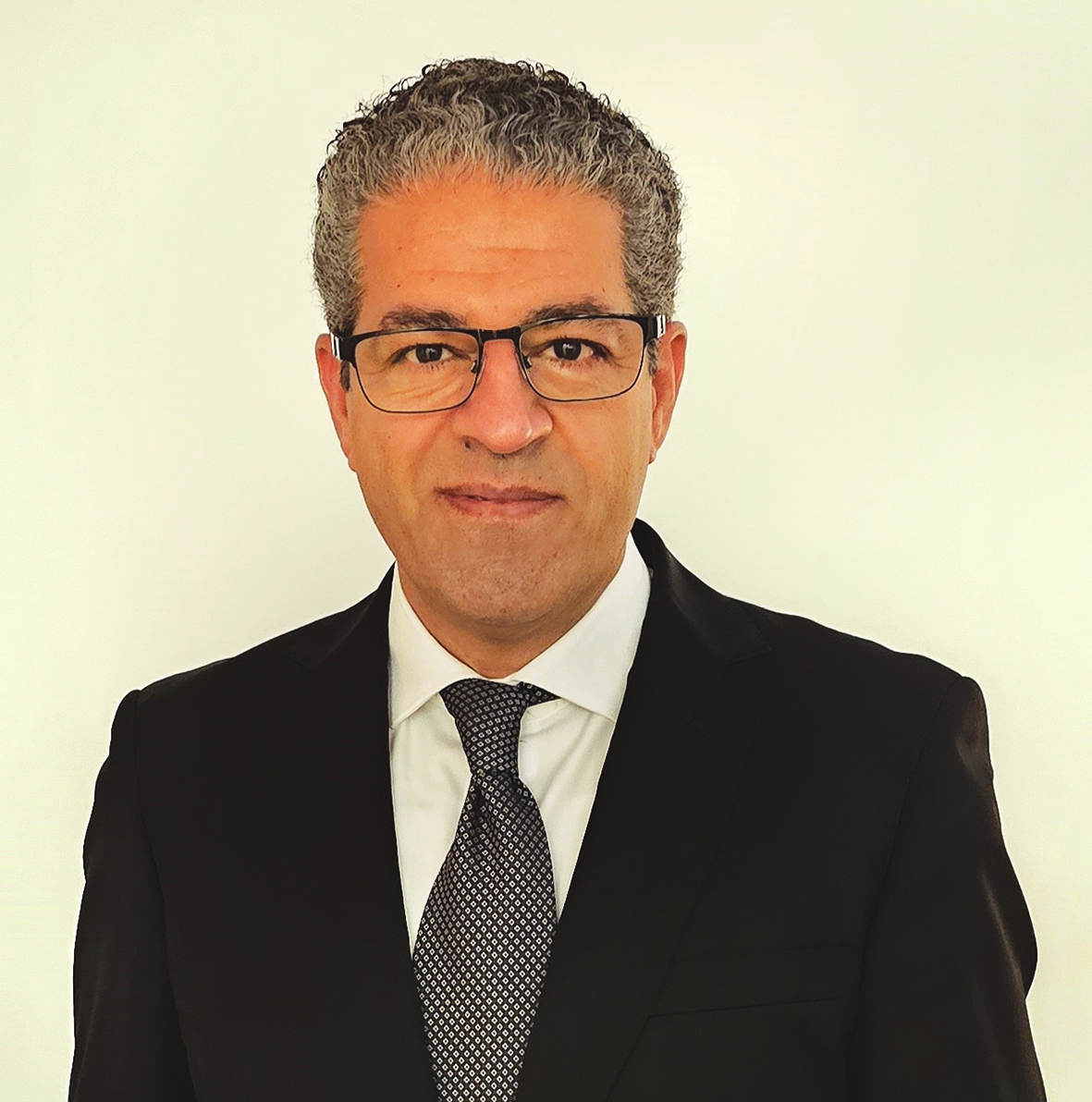Editor's Note:
The year 2024 marks the beginning of the second decade of the development of the Belt and Road Initiative (BRI), a global cooperation platform China proposed in 2013 to support and add vitality to economic globalization and to help resolve global development challenges and improve global governance system. Against this backdrop, the Global Times is publishing a series of interviews with renowned scholars, think tanks, and financial institutions, sharing their insights on related topics. Global Times reporter Tao Mingyang (
GT) recently interviewed Hussein Askary (
Askary), vice-chairman of the Belt and Road Institute in Sweden, to discuss how the BRI could maintain its momentum after one decade of development amid rising global headwinds.

The Jakarta-Bandung High-Speed Railway, a BRI flagship project at Indonesia Photo: CFP
GT: The year 2023 marked the 10th anniversary of the BRI. How do you evaluate the effectiveness of the BRI in improving infrastructure and promoting economic development in the partner countries?Askary: The most important aspect of the BRI in its first 10 years is the establishment of a new model of cooperation among nations, particularly in the areas of infrastructure development and connectivity. This model addresses the long-standing issue of governments lacking coordination in planning, financing, and implementing infrastructure projects in a systematic manner.
The most important aspect is connectivity in transportation. For example, there has been large-scale development of railways, highways, ports, airports, and other infrastructure in many parts of the world. A recent example is the China-Laos Railway, which has transformed Laos from a landlocked country to a connected one, promoting economic development.
Furthermore, there are important projects in Africa that have significant impacts on the economies of those countries. For instance, the Addis Ababa-Djibouti Railway connecting Ethiopia and Djibouti has freed the Ethiopia from its isolation and has greatly contributed to its economic development plans.
During the financial crisis in 2008 and 2009, in Greece, China's COSCO took over the operation of the Piraeus Port and developed it into one of the most important ports in the whole Mediterranean. The port also improved the connection to the rest of Europe, such as the Hungary-Serbia Railway, which is crucial and is one of the key projects in Europe that China is contributing to building.
Therefore, there are enormous advantages in all these projects, including in the telecom sector. In many African countries, both nationally and regionally, telecom and internet connectivity have greatly improved.
GT: In your opinion, what are the challenges BRI could face in its 11th year of development and moving forward?
Askary: China has almost single-handedly shouldered the burden and challenge of building infrastructure in all of these parts. The US and the EU have almost abandoned these kinds of development processes outside of the US and the EU.
What is needed is for more nations and institutions around the world to contribute to the BRI, rather than relying solely on China for support. For example, financially, we are now seeing multilateral institutions such as the Asian Infrastructure Investment Bank, the BRICS, and the New Development Bank contributing to infrastructure and other development projects. In addition to financial challenges, there are also geopolitical and security challenges. These challenges are often the result of interference, primarily from Western powers, in the internal affairs of countries in regions such as the Middle East, North Africa, and other parts of the world.

Hussein Askary Photo: Courtesy of Hussein Askary
GT: In recent years, both the US and Europe have launched high-profile global infrastructure plans of their own. What kind of reception have these initiatives received so far?
Askary: I think the US, the G7 and the EU have "announced," not "launched," infrastructure initiatives.
There were many proposals made, but they turned out to be only on paper. For example, the European Parliament in 2018 announced the EU-Asia connectivity, and in 2021, the US announced the Build Back Better Framework within the country but was changed to the Global Infrastructure Partnership because the US failed to launch the ideas set out in the framework.
So, if the US is unable to build such an initiative at home, how can they do it outside? There are three points that make me believe they are not serious.
First of all, they say the private sector should finance it, making it financially sustainable. Most of the development in the US and Europe was carried out either by government-backed programs or government-built programs for railways, highways, dams, nuclear power, and space projects. Infrastructure is not a profitable business for private companies because these are very long-term projects with very low financial yield for the builders.
As a result, banks and financial companies are no longer interested in investing in infrastructure projects. This lack of interest is a clear indication that these Western alternatives to the BRI are not genuine.
Second, these alternatives claim to prioritize environmental sustainability. While this may sound appealing, the criteria set forth often make it nearly impossible to proceed with many projects. For instance, the US and the EU consistently oppose hydropower projects in Africa, along with other major infrastructure developments such as highways and railways. They argue that these projects are not environmentally sustainable, but this perspective is flawed. In reality, building infrastructure can actually have a positive impact on the environment. In these places, poverty is the biggest environmental problem.
At last, these initiatives are unlike the BRI as they are exclusive. It is for a select club of nations, with many political strings attached. For example, they include only countries that the US and the EU consider to be "democratic" and friendly to the West. Nations like Iran, for example, will not be allowed into this club. Many other African nations will also not be allowed into this club because the US and Europe do not consider them to be democratic or because they have differing political views from the West.
GT: Could you compare and analyze the attractiveness of China's initiative and those of the US and Europe across the "Global South"?
Askary: The reason that BRI is attractive is, first of all, its inclusivity as it is open to everyone. Second, it is based on equality and coordination between China and other partner countries. As BRI upholds the Five Principles of Peaceful Coexistence, it shows that the China-proposed initiative coordinates with the development goals of other partner countries. China does not impose its ideas on those countries, but promotes what those countries consider their own national interest development goals.
Another important aspect is that China treats those countries as equals and coordinates the financing of infrastructure projects, such as building roads and bridges. And also, it is based on the concept of win-win, where the national interests of those countries are also taken into consideration, not just the interests of China in these regions.
This is why it is attractive, as China does not impose political demands on these nations in exchange for concessions, unlike Western proposals.





